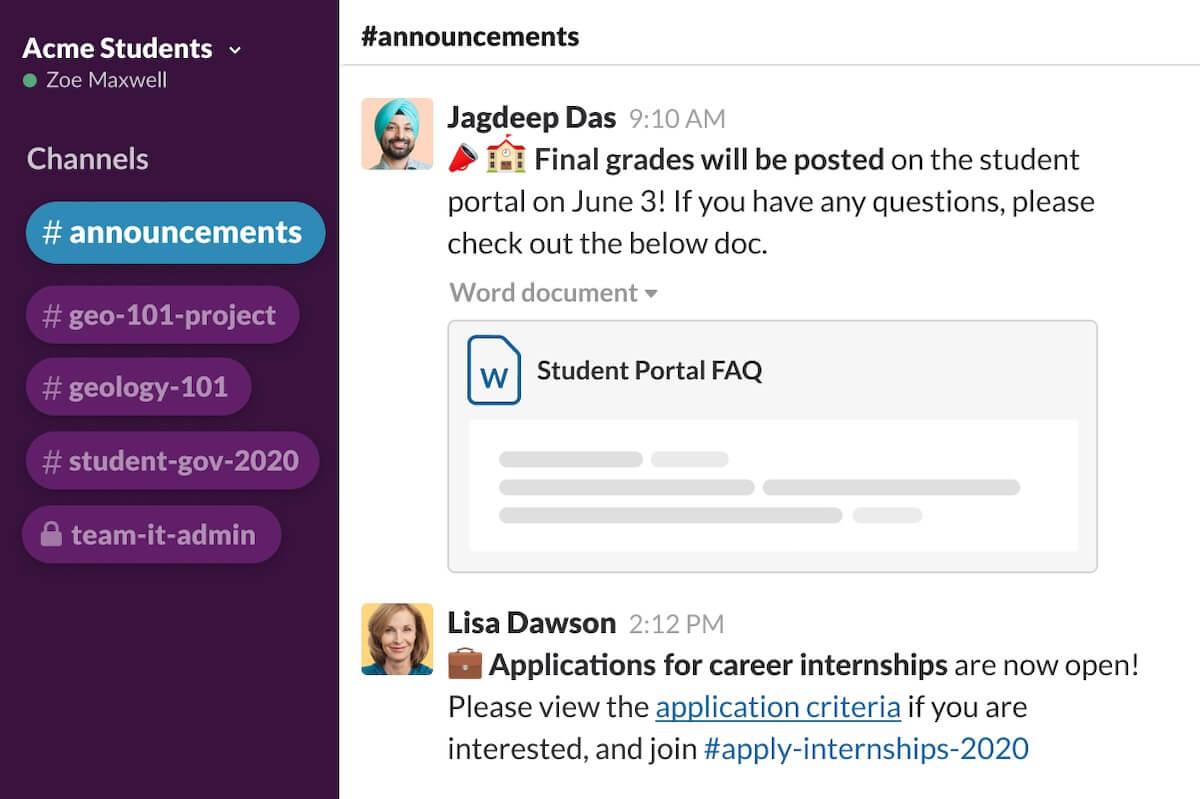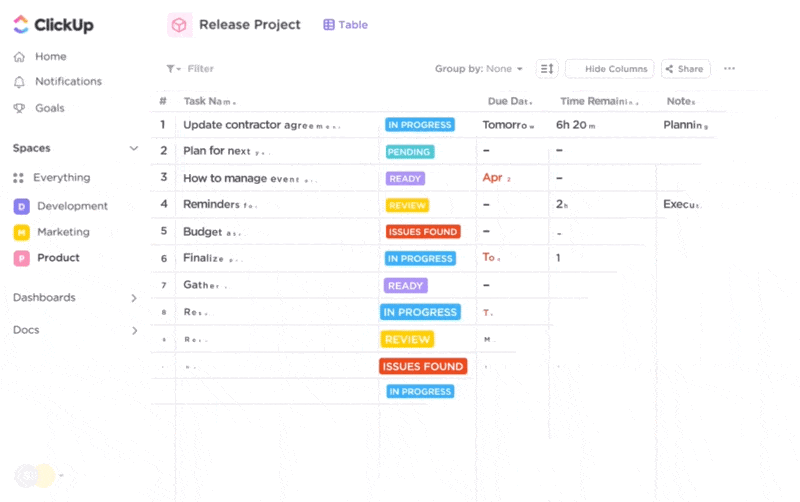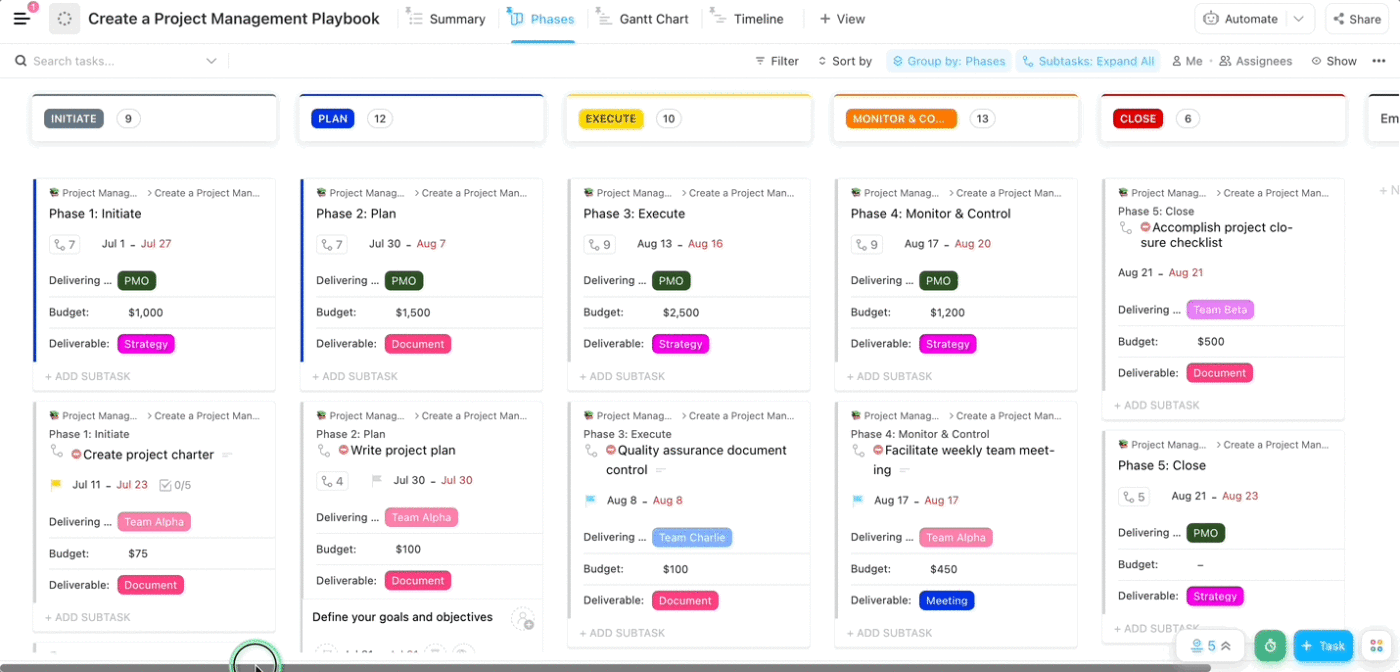

Collaborating between multiple teams while managing approaching deadlines and sprint timelines is challenging.
Although hundreds of collaboration tools are available, Slack and Monday (monday.com) are two that stand out.
Slack is easy to use and makes collaboration a breeze. At the same time, Monday stands tall for project management and planning.
Is it collaboration overkill to use them together? Can one replace the other? Is there another tool in the mix that can replace both?
Buckle up for the ultimate comparison between Slack and Monday.com. A breakdown of what they offer in features, pricing, support, and more. And which is the best for collaboration.
To begin with, let’s overview Slack.
What Is Slack?

Slack is a cloud-based team communication app that allows you to collaborate with your team when, where, and how it’s best for you. It integrates with thousands of other apps, making it a versatile team collaboration app.
Slack simplifies team communication. Use it to:
- Chat in real-time via invite-only channels or direct messages
- Send audio/video clips
- Share files
- Talk on live video or audio calls (via huddles), and more
Below is a complete breakdown of Slack’s core features and how they help you achieve your communication goals.
Slack features
1. Real-time communication
Slack offers multiple communication options, including direct chat, project-focused, shared channels, and live audio or video calls. Use interactive elements like reactions, emojis, GIFs, and @mentions to spice up conversations.

2. Canvas for collaboration and workflow automation
Canvas helps project managers organize, curate, collaborate, and share information from a single place.
Slack doubles as a project management tool with Canvas. Create a custom canvas for anything you’re working on—meeting notes, projects, or checklists, and then share it in the appropriate Slack channel to collaborate with your colleagues.
For example, Canvas is suitable for creating meeting agendas beforehand. Use it to add/edit topics of discussions, create action items, use @ mentions to add attendees, or assign tasks to them directly.

Best of all, Slack Canvases come with a pre-set template gallery. Choose from templates for employee onboarding to product briefs and weekly sync—so you never have to start from scratch.

3. Apps and Integrations
Slack further integrates with your favorite collaboration and productivity apps. Find over 2600+ apps in Slack’s app directory, including most life-saving tools like Google Drive, Microsoft Teams, HubSpot, Gmail, and more.
Additionally, build custom apps using Slack APIs.
For example, use apps like Polly to run a fun poll or quiz across channels. Press [/] to trigger the app anytime in between conversations.

4. Work-Flow Builder (Automation)
If you thought Slack was just another messaging tool, hold my beer! 🍺
Slack has game-changing automation modules that work on simple drag-and-drop functions (no coding required). Use them to transform everyday processes into automated workflows quickly.

Using Slack Canvas for an asynchronous stand-up makes team communication smoother, especially if folks work in different time zones or have busy schedules. Here’s how it works.
- Set up a dedicated canvas in Slack specifically for stand-up meetings. Share updates, keeping everyone on the same page
- Create a standard update format: cover key progress, wins, challenges, and plans. Keep it concise but comprehensive
- Post updates whenever it suits each team member. Add bullet points or short descriptions, contributing whenever it fits their schedule
- Check out and comment on each other’s updates in the canvas, fostering collaboration despite different work times
- The canvas becomes a record of everyone’s progress, a useful resource for tracking past updates and maintaining a shared understanding of ongoing work
- Set reminders to check the canvas regularly so updates are seen and responded to on time
- Adapt the format or canvas structure based on team feedback to ensure it’s effective in capturing info and fostering teamwork
Communicate effectively, collaborate better, and stay informed about ongoing tasks, all while accommodating various schedules and time zones.

Slack’s no-code workflow builder lets you automate processes using functions, conditions, and triggers. Create custom miniature-size apps (Slack bots) using Slack API.
Brownie points to Slack’s developer tools! They simplify the development processes with handy online resources and docs.
Slack’s pricing
- Free forever
- Pro: $8.75/month per user
- Business+: $12/month per user
- Enterprise Grid: Custom pricing
What is Monday?
Monday.com, also known as Monday, serves as a comprehensive project management and collaboration tool. Its customization makes it an essential tool for project management and streamlining business workflows.
Unlike Slack, the platform inclines toward management rather than collaboration alone. Work with intuitive dashboards, task management boards, and customizable workflows.

Monday also features a dedicated app marketplace for widgets and third-party apps. Use it to expand and improve on Monday WorkOS capabilities.
Monday features
1. Easy-to-use
We find monday.com’s WorkOS visually attractive and intuitive to use. Managing projects is simple with drag-and-drop, click-and-done tools–no code involved.
For instance, easily drag and drop items, widgets, visuals, and team members on your dashboard to add them in a snap.
Tweak the same dashboard with resource management widgets like time tracking, workload indicators, etc.

Easy, right?
What’s more, choose from Monday’s extensive gallery of 200+ pre-built templates to never start from scratch.

2. Collaboration
Monday.com’s WorkDocs excels in collaboration with its intuitive features like real-time updates, file sharing, and seamless communication.
Co-edit in real-time, share instant comments, and engage with employees—all in one doc. Go beyond collaboration and turn your text into action items on any monday.com board to keep things moving smoothly.

3. Management
Work with customizable dashboards and boards that offer various views like Kanban, calendar, timeline, Gantt chart, and more. No matter what your team, project, or business needs are, Monday has something for you.

Add over 30+ custom widgets to get a holistic view of the project—including widgets for time tracking, workflow, and performance measurement.

4. Apps and integrations
Monday.com boasts a robust app directory with 200+ third-party apps, including communication, marketing, ERPs, CRMs, and more. Find integrations to popular apps like Slack, Google Calendar, MailChimp, HubSpot, and other tools.
5. Automation and workflows
Monday’s WorkOS offers a user-friendly no-code workflow builder with a bonus of over 200+ pre-built automation templates. Use them or create custom automation to trigger workflows based on events, actions, or functions.

Monday pricing
- Free Forever
- Basic: $8/month per user
- Standard: $10/month per user
- Pro: $16/ month per user
- Enterprise: custom pricing
Slack vs Monday.com: Features Compared
If you’re here, you know that both Slack and Monday carry impressive collaboration features.
However, Monday stands out for its customization and management tools, while Slack keeps it simple and excels at team communication.
Check out this table for a quick rundown of the main differences between the two.
| Slack | Monday | |
| Real-time Chat | ✅ | ❌ |
| File Sharing | ✅ | ✅ |
| Dashboards | ❌ | ✅ |
| Automation | ✅ | ✅ |
| Integrations | ✅ | ✅ |
| Visualizations | ❌ | ✅ |
| Tracking and Analytics | ❌ | ✅ |
| Customizations | ❌ | ✅ |
| Templates | ❌ | ✅ |
| Bot Framework | ✅ | ❌ |
| Mobile App | ✅ | ✅ |
Let’s dig into their core features to find the ultimate collaboration software.
Feature #1. Team communication
Let’s face it: Project managers struggle to keep teams on the same page. Emails are great, but most email platforms have next-to-no integrations.
Let’s see how Monday.com vs Slack stack up in fostering team communications.
Slack
Slack better qualifies as an advanced messaging platform. The tool lets you talk to different teams on all fronts–chat, audio, and video calls.
Create channels to broadcast information or directly message people. Even better, private spaces work as secured discussion boards to communicate departmental messages and follow-ups.

Monday
Monday WorkOS, however, does not have a built-in chat feature (for now).
But yes, you can communicate publicly on discussion boards. Which means you cannot individually message a user.
However, Monday has the option to communicate publicly via discussion boards. Find interactive elements like @ mentions, emojis, annotation, and more to comment and communicate efficiently within the task bucket.
Winner: Slack is a clear winner for us regarding real-time messaging and communication features.
Feature #2. Collaboration
When it comes to Monday vs Slack, both have their unique set of features to collaborate on projects.
Let’s see who has got the best one.
Slack
Slack, being more of a messaging app, provides Canvases for team collaboration.
No doubt, Canvases are good! But they need customizations and key features.
More or less, you’ll find it like a note-taking tool where you put in important information, share files, embed videos, and co-edit with stakeholders.
Create automated workflows to request support, submit approvals, or report issues—within the canvas.
For instance, use Slack’s ‘Incident Summary’ Canvas template to highlight issues, request priority actions, and ask questions by mentioning the right people in the Canvas.

Monday
Monday, on the other hand, offers Workdocs to collaborate and execute ideas from a single sheet. Transcribe meetings, highlight key points, and tag team members to assign meeting agendas on the spot.

Embed boards, dashboards, images, videos, and more directly into workdocs. The best part is that every component is automatically synced and updated as you work.
Winner: Both tools offer unique collaboration features, so it’s a tie! 🤝
Feature #3. Management
It’s hard to find both—collaboration and management—features in one definite tool. Let’s see how Slack and Monday deal with project management.
Slack
Slack is primarily designed for team communication. However, having options to create private channels, groups, and canvases does help in team management. That being said, we don’t expect Slack to manage complex projects.
Monday
Though inferior to Slack at real-time communications, monday.com manages tasks, workflows, and projects well.
Monday has many management features, including customizable boards and views to help you centralize all your work. Share boards across teams for better collaboration!

Not to forget, Monday’s intuitive dashboards can be fully customized with widgets—without a single line of code. Find widgets for real-time time tracking, workload overview, and analyzing the team’s performance under one roof.

Winner: Monday is a winner in this category because of its comprehensive management features and tools.
Feature #4. Apps and Integrations
When juggling between different projects and departments, you never know what apps you might need at any point in time. Fortunately, both monday.com and Slack come with a bunch of third-party integrations.
In Slack vs monday.com, who wins in this category? Let’s find out.
Slack
Slack boasts an app directory of 2,000+ industry-leading apps and software.
Additionally, the tool offers custom APIs, enabling you to build custom apps that integrate with your internal systems and processes.
Monday
Monday offers integrations to over 200+ third-party apps from various categories, including, but not limited to, communication, productivity, CRMs, and more.
Winner: Both collaboration tools offer powerful, limitless integrations. And so we have another tie! 🤝
Feature #5. Automation and workflows
Both platforms offer easy-to-do no-code automation. Automate anything using simple drag-and-drop building blocks—from simple to complex workflows.
Besides, both have plug-and-play connectors that make integrating other apps a walk in the park.
So where’s the difference? Let’s find out.
Slack
Slack has a robust bot framework that allows you to build custom bots.
Use them to automate monotonous tasks and workflows, like auto-assign tasks and send updates and reminders to channels.
Monday
Monday, in contrast, offers pre-built automation templates to ease workflow development. Choose from over 200+ diverse automation recipes and templates.
Winner: Because of Monday’s pre-set automation templates, building workflows is a cakewalk. And so, we consider Monday as a winner in this category.
Slack vs. Monday.com on Reddit
We took the best collaboration tool debate to Reddit. And guess what! We came across some real-world user reviews.
For example, when we searched Monday vs Slack on Reddit, many users felt it’s hard to onboard key players or team members in your updates and workflow.
“Sure, it’s great for tracking time and money spent on projects and generating invoices. But it makes it seriously hard to include freelancers, clients, partners, and other key external people in your updates and workflow. Alas, no API or SaaS solution can fix the fact that Monday does not play nice with spreadsheets.”
While Slack was loved by most users for its easy-to-use interface, integrations, and communication features.
Meet ClickUp—The Best Alternative to (Slack vs. Monday.com)

Monday and Slack–both have certain limitations. Want to have a tool that has it all? Switch to ClickUp!
ClickUp is your all-in-one app to manage tasks, Docs, Chat, Goals, and more in one place. Whether you’re a student, small business owner, or project manager looking to collaborate, ClickUp is designed to take team collaborations to the next level.
ClickUp offers Monday-like project management tools and Slack-like real-time communication.
Don’t believe us? Take a look at ClickUp’s collaboration features.
1. Built-in chat feature
ClickUp Chat is a go-to tool to share updates, link resources, and seamlessly collaborate on the fly—all you need is a reliable internet connection.
Like Slack, the ClickUp chat feature allows you to create different spaces or chat groups alongside projects. Enable role-based access to control who can view conversations, keeping talks private as long as you want.
Even better, use @mentions and directly assign comments to notify members of messages in real-time.

2. ClickUp AI

ClickUp AI is revolutionizing team collaboration. With AI on your side, focus on what matters and let AI handle other monotonous tasks, such as:
- Drafting project briefs
- Creating project timelines
- Generating summarizes for task updates
- Creating action items and subtasks
- Editing and formatting content within seconds
- Ideating project marketing campaign strategies

Comparably, ClickUp beats Monday in AI assistance.
Here’s why:
Monday.com’s AI is limited to its Sales CRM. At most, use AI to summarize text in Word Docs.
On the other hand, ClickUp uses AI for project planning, creating action items, sub-tasks, and writing fluently. Even better, use our AI prompt templates for better project management and engineering.
3. Project management
ClickUp project management feature offers 10+ customizable views, making project planning and management easier and quicker.

Use Whiteboards and Mind maps to plan your projects, ideas, and tasks using visual outlines. ClickUp offers an extensive gallery of project management templates for mind mapping and planning.
What’s more, ClickUp’s intuitive dashboard acts as a control center for your project. From here, track and manage development sprints and resources in real-time. Use custom charts, widgets, and data visualization elements to further customize the dashboard as per your project needs.
Let’s be honest; teams love Slack’s UI for communication. And because it is so, ClickUp Slack integration lets you collaborate on projects without leaving Slack.

Switch to ClickUp: Your All-in-One Collaboration Tool
Instead of juggling through Slack and Monday alternatives, pick a tool that combines collaboration, communication, and management features in a single platform.
Why not try ClickUp today? – it’s free to get started!



